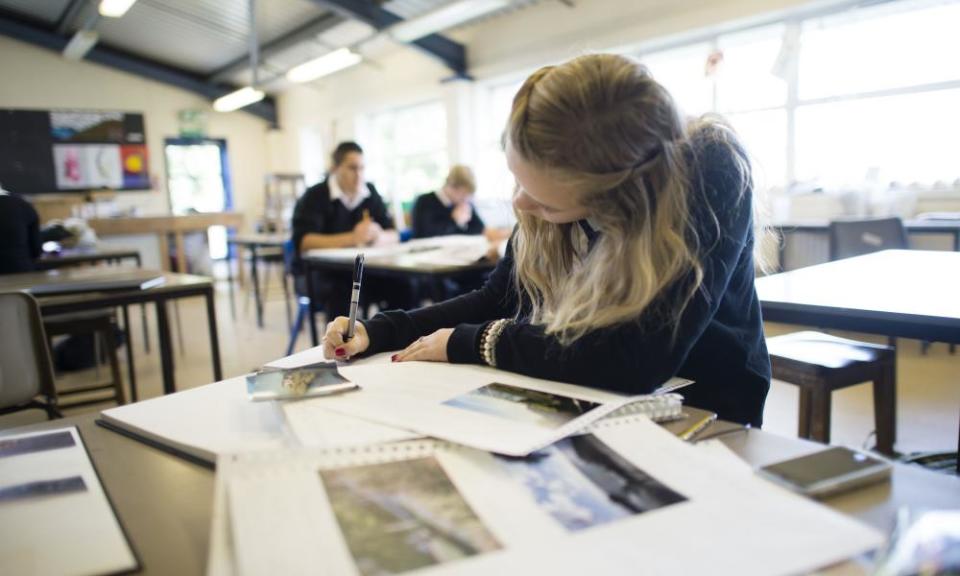Proportion of students taking arts subjects falls to lowest level in decade

The proportion of 15- and 16-year-olds in England studying arts subjects such as music and drama has fallen to the lowest level in a decade as a result of government policies and education cuts, figures show.
A report by the Education Policy Institute suggests schools have whittled down the number of pupils taking the likes of dance and fine art at key stage four, after reforms pushed pupils towards more traditional academic subjects such as geography and English.
The EPI report published on Thursday blamed the Department for Education (DfE) over its new Progress 8 performance measure – based on results from predominantly academic subjects at GCSE – and its promotion of the narrow English Baccalaureate (EBacc) suite of subjects as partly responsible for the shift.
Kevin Courtney, joint general secretary of the National Education Union, said it was clear that the Ebacc and Progress 8 performance measures were squeezing arts subjects out of schools.
“The influence of the EBacc works against a broad and balanced curriculum and it is imperative that it be withdrawn,” said Courtney.
“Subjects such as art, music and technology, that are not just crucial for our economic prosperity but also enrich lives, are disappearing from our schools.”
According to the EPI’s estimates, about 19,000 fewer pupils took arts subjects at key stage four last year compared with in 2014.
The EPI study differed from previous research in that it also counted non-GCSE arts qualifications, which had been popular until the DfE excluded many of them from its performance tables.
“This recent drop in arts entries is driven by several factors, including changes to the way school performance is measured such as EBacc or Progress 8, financial pressures on schools, and of course local decisions taken by school leaders,” said Becky Johnes, senior researcher at EPI.
Progress 8 counts specified results achieved in subjects including English, sciences, maths, modern foreign languages and history or geography, along with a maximum of three other approved academic or vocational qualifications.
Ministers have said the three open subjects offers room for pupils to study arts, but teachers and school leaders argue the measure has been reinforced by the Ebacc, a school performance measure based solely on passes in English, maths, history or geography, sciences and languages.
The EPI study found that pupils who were not entered for the EBacc were more likely to study at least one art subject. However, the EPI found that high-performing schools that achieved good results in arts subjects were more likely to continue offering them to pupils.
The Ebacc was also blamed in part for the failure of state schools to teach the required amount of religious education.
The Commission on Religious Education – made up of academics and educationalists – called for “strategic, urgent intervention” to halt the decline in religious education (RE) in schools, in a report also published on Thursday.
“All students need a thorough understanding of religious and non-religious worldviews, regardless of their own personal views, as a vital preparation for life and employment in modern Britain,” said the Very Rev Dr John Hall, the Dean of Westminster who chaired the commission.
“The evidence is that too many state schools are failing to meet their legal obligations to provide religious education for all students. This is unfair.
“So we are recommending a national entitlement for RE and that all schools should be required to give an account of how they make the provision.”
A survey by the commission found that a quarter of schools did not offer RE to students at key stage four. The exclusion of religious studies from the Ebacc was one of the reasons for the fall, along with the DfE’s exclusion of previously popular short-course GCSEs from performance tables.

 Yahoo News
Yahoo News 